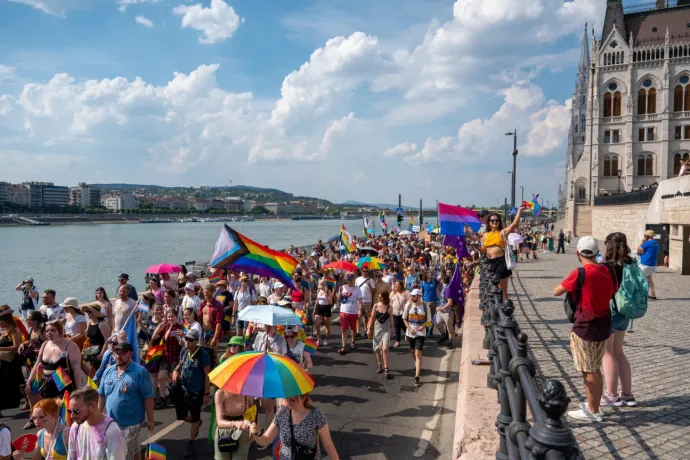The number of Hungarians in favour of gay marriage has increased one and a half times in ten years

The proportion of those who agree that same-sex couples should be allowed to legally marry has increased by more than 15 percentage points in Hungary, 24.hu reports based on the findings of an Ipsos survey. In 2013, 30 percent of Hungarians surveyed considered gay marriage acceptable, while today 47 percent of the population feel this way. A total of 67 percent think that some form of legal recognition should be given to same-sex partnerships, while 16 percent are completely against it.
Although Hungary's figures are better than the average of the 30 countries surveyed, we are still among the bottom eight. Hungary is followed by Peru, Japan, South Korea, Poland, Singapore, Romania and Turkey, with the Netherlands, Portugal and Spain at the top of the list.
This is not the only thing the researchers examined. They also found that in the 30 countries surveyed
- 3 percent of the respondents identified as lesbian or gay,
- 4 percent as bisexual,
- 1 percent as pansexual or omnisexual,
- and 1 percent declared themselves asexual.
Those born after 1997 were twice as likely to identify as bisexual, pansexual/omnisexual and asexual as those born between 1981 and 1996, and four times as likely as those born between 1948 and 1980.
In the 30 countries surveyed, an average of 1 per cent said they were transgender, non-binary/sexually fluid and 1 per cent didn't identify themselves on the male/female axis. The proportions also vary between age groups on this question, with younger people more likely to say they fall into one of the above categories. On average, 9 percent of the population classifies themselves under the LGBTQ+ umbrella.
Two percent of the surveyed Hungarians said they were lesbian/gay/homosexual, 3 percent bisexual, 1 percent pansexual or omnisexual, with the number of those identifying as transgender or not in the male/female categories also being 1 percent.
Globally, on average, half of the adults reported having a gay or lesbian relative or acquaintance, a quarter reported having a bisexual relative or acquaintance, and 12-13 percent reported having a transgender, non-binary or genderfluid relative or acquaintance. However, this varies around the world: the visibility of LGBTQ+ individuals is high in Spain, Latin America, Thailand and the English-speaking world, and is the lowest in Japan, South Korea, Turkey and Eastern Europe. 36 percent of Hungarian respondents said they know someone who is gay or lesbian, 21 percent have a bisexual acquaintance, 6 percent know someone who is transgender and 4 percent know someone identifying as non-binary or genderfluid.
In 2013 when asked whether they agree that same-sex couples should have the same rights as heterosexual couples when it comes to adoption, 42 per cent of Hungarians said yes. This was 59 percent in 2021, but has now dropped slightly to 56 percent.
59 per cent of Hungarians surveyed said that same-sex couples could be as successful as other parents in raising children, but a third said they would be less so.
The survey revealed that globally, 67 percent of people believe transgender people face discrimination and 76 percent are of the opinion that they should be protected against this, especially when it comes to jobs and housing. Of course, this is not the general case either, with younger adults and women being more supportive of equal opportunities for transgender people. South Korea, Eastern Europe, the US and the UK were the least supportive.
"48 percent of Hungarian respondents oppose allowing transgender teens to receive counselling or hormonal treatment for gender reassignment with parental consent, and only 36 percent would support it, with even fewer (25 percent) in favour of allowing social security coverage for this – which puts Hungary at the bottom of the list."
- 24.hu quotes from the survey.
The majority of Hungarians (45 percent) support the use of public toilets based on gender, but only 43 percent support the inclusion of a third category in addition to male and female on official documents, while 41 percent are explicitly against it.
When asked whether health insurance should cover sex-change operations, 59 percent of Hungarians said no, while 25 percent said yes. This puts us in last place on the list regarding this question.
Ipsos surveyed 22,514 adults aged 16-74 living in 30 different countries between 17 February and 3 March 2023. For 17 countries, including Hungary, the results are representative. The average of the 30 countries is not adjusted to the population size. The margin of error is 3.5 percentage points for a sample of 1,000 people and 5 percentage points for a sample of 500 people. A detailed study based on the survey is available here.
For more quick, accurate and impartial news from and about Hungary, subscribe to the Telex English newsletter!